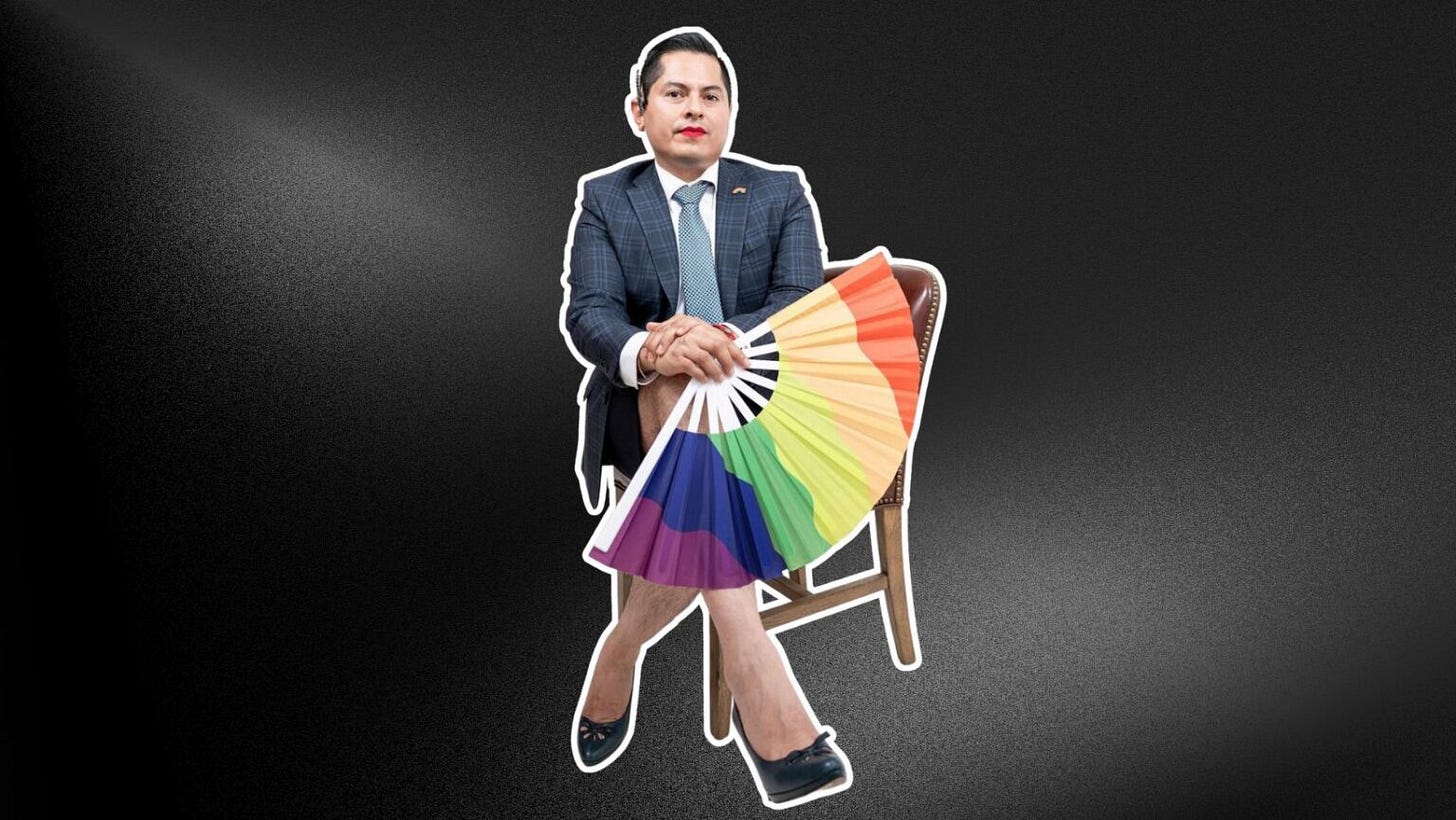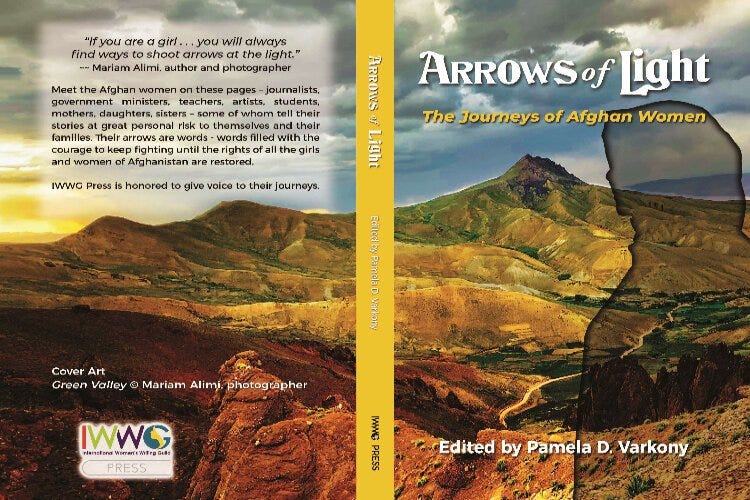Global Roundup: Chinese Boxers Breaking Gender Norms, Justice for Mexico’s 1st Nonbinary Magistrate, Afghan Women’s Stories, Iranian Women’s Rights Art Exhibition, Newfoundland Queer History History
Curated by FG Contribtor Inaara Merani
Mao (right) leads a training session at her boxing gym in Shanghai, Oct. 22, 2023. Courtesy of Mao’s boxing gym (Sixth Tone)
Throughout China, dozens of young Chinese women are seeking to break out of traditional gender norms, and for many, this has meant stepping into the boxing ring. At Mao’s boxing gym in downtown Shanghai, a women-only gym, women in their 20s and 30s meet after school or work, help each other put on their hand wraps, and then spend the next two hours training with one another.
I never imagined how popular this training spot would become when I started out 13 years ago. – Gong Jin, owner of Mao’s boxing gym (prefers the name Mao)
Many women across China claim that boxing has given them a new sense of confidence, helping them to feel physically and mentally stronger and better defend themselves. Boxing has exploded in popularity amongst Chinese women in recent years, as women break out of traditional gender norms and adopt a new doctrine for empowerment.
The increase in young women boxing has not come without criticism, with many perceiving the sport as unfeminine. In recent years, the sport has also become associated with radical feminism in China; the Chinese word “nüquan” can mean “female boxer” and “feminism” when spoken out loud. Over time, this term has been adopted as a way to mock radical feminists.
Mao, the owner of Mao’s boxing gym, resonated with this ridicule and stated that when she started boxing as a teenager, other students used to make fun of her for participating in “men’s stuff”. Although the comments stung at first, Mao kept training and gradually grew to love how boxing made her feel.
Boxing has supported the most fragile part of me. I hope this gym can help more women experience the same feeling. They can and should feel more powerful. – Mao
Credit: Instagram/@ocielbaena. (Be Latina)
Jesus Ociel Baena was Mexico’s first openly nonbinary judge and trailblazer for LGBTQ+ rights in Mexico and throughout Latin America. They were appointed as a magistrate last year, which was seen as a breakthrough moment for the LGBTQ+ community in Mexico, who face high rates of discrimination and violence.
Baena was found dead on Monday morning, alongside another individual identified as their partner, which has sparked protests and calls for a thorough investigation. The pair was found with wounds from a sharp object, however there was no indication of an intruder. LGBTQ+ rights activists have since pointed out that Baena had been threatened for their activism and have called for just and unbiased legal proceedings.
They were a person who received many hate messages, and even threats of violence and death, and you can’t ignore that in these investigations. – Alejandro Brito, director of Letra S, LGBTQ rights group
On Monday evening, thousands called for justice at a vigil in Mexico City, shouting “we won’t stay silent”, while lighting candles for Baena. Alejandro Brito, director of the LGBTQ rights group Letra S, worries that Baena’s death could intimidate or possibly spark violence against LGBTQ+ people.
The National Observatory of Hate Crimes Against LGBTI+ Persons in Mexico, from 2019 until 2022, registered 305 violent hate crimes against sexual minorities, including murder and disappearances. Baena was very outspoken about their gender identity and recently succeeded in winning official recognition for the gender-neutral noun “maestro” for magistrate.
I am a nonbinary person. I am not interested in being seen as either a woman or a man/ This is an identity. It is mine, for me, and nobody else. Accept it. – Jesus Ociel Baena
Afghan women share stories of strength and perseverance in “Arrows of Light: The Journeys of Afghan Women,” a book edited by Tampa resident Pamela Varkony. Provide by Pamela Varkony. (83 Degrees Media)
Arrows of Light: The Journeys of Afghan Women is a compilation of Afghan women’s stories during and after the American withdrawal from Afghanistan. Comprised of personal essays, photographs, and artwork, this book tells the stories of the women who refuse to be victims, and instead choose to live with defiance.
Arrows of Light was edited by motivational speaker, world travel, and award-winning writer Pamela Varkony from Pennsylvania. Each story in the anthology is personal and unique to each woman and their family, but it is also universal to the experience of Afghan women living under Taliban rule. Due to the rising political tensions, many of the women who contributed to the anthology fled Afghanistan after spending most of their lives in the country, however, some women continue their fight from within the nation’s borders.
Sedra Eman, for example, studied in Kabul and began a career in accounting, and then became the social media manager of the first online bookstore in Afghanistan, Kabul Reads. After the Taliban took over Kabul, the business was closed immediately. Months later, she opened Alvaan Online Giftshop, her own virtual business, which was also shut down by the Taliban. Meena Habib, however, never imagined leaving Afghanistan but after pursuing a career in journalism, writing about the rights of Afghan people, and winning awards (despite her family’s disapproval), she was threatened with death by elected officials, attacked by the Taliban, and was arrested. She worked for two Afghan media companies and later founded Roidad News, the only woman-led news agency in Afghanistan. These are just two stories of the thousands of Afghan women who were forcibly displaced, who lost their jobs, and who lost their fundamental rights as women and human beings.
This anthology gives individuals the opportunity to hear from Afghan women firsthand about their experiences under Taliban rule. Their stories and artwork convey powerful messages about how they find ways to resist the constant repression of their rights.
They support each other. They care for each other. When they call each other sister, they aren’t kidding…They are just defiant. – Pamela Varkony
Credit: Minoo Safai-Amini. (ABC 10)
At Sacramento State in California, “The Seen Iranian Woman” is a new exhibition which features artwork made by Iranian artists. The exhibition details the struggle for women’s rights in Iran through art, fashion, poetry, and history.
Jaleh Naasz, Iranian immigrant and lecturer for the Fashion Merchandising and Management department at Sacramento State, felt deeply connected to the woman’s revolution last year in Iran. She was also heavily concerned with the lack of news coverage in the US. Inspired by the movement and wanting to raise more awareness about the events in Iran, she created “The Seen Iranian Woman” exhibition.
With artwork from Sacramento State students, Iranian artists, poets, and designers, and donated garments and textiles from University alumni, this exhibition reflects the collaborative involvement of a number of individuals and organizations.
As an Iranian, I wanted to have a place to process what is happening. As an educator, I wanted to have a place where people felt more informed on the topic. There isn’t a lot of information that we learn about Iran and Iranian people…I really hope that when people walk through this exhibit they can visualize how quickly things can change, how quickly a society can change, how gradual laws can make dramatic shifts and how easily women’s rights can be jeopardized. – Jaleh Naasz
Naasz believes that fashion is all about self-expression and that it can be used as a political tool to stand up for one’s rights. She hopes that, whether it is because of art or fashion, people who visit the exhibit will leave with a better understanding of the conditions in Iran.
One of the main messages coming out of Iran was, ‘Be our voice. Listen to us.’ These people were sending videos of themselves, they were sharing their stories, knowing that their life was on the line for doing that. And so, anyone who is in a position to listen to that, to hear it, to watch it, and to talk about it and to share it, I find that to be extremely important, both for the people there and also for the people here. – Jaleh Naasz
The exhibit will be on display at the University Union Gallery until November 16, and will conclude with a closing reception.
St. John’s writer Rhea Rollmann is the author of A Queer History of Newfoundland. (Tania Heath/Submitted by Rhea Rollmann). (CBC News)
Author Rhea Rollman spent years compiling more than 150 interviews and pieces of archival material through her journalistic reporting. Her hard work and efforts came to fruition earlier this fall when she published a book documenting Newfoundland and Labrador’s queer history, highlighting the individuals who helped push the queer movement across the province, Canada, and the world.
It’s hard to describe just how powerful it was. I knew we had a powerful queer history, but I didn’t know just how deep it was. – Rhea Rollmann
Rollmann chose to write A Queer History of Newfoundland to highlight the rich queer history in the eastern Canadian province, but to also celebrate the individuals who helped pioneer the provincial queer movement. Rollmann added that many queer Newfoundlanders played a large role in the spread of queer rights across Canada, and highlighting the voices of their past can help provide important context to today’s discussions about queer identity.
According to Rollmann, organized queer activism in Newfoundland dates back to at least 1974, but queer presence and community stretches back even further. Her book focuses on the fight for human rights protections, AIDS activism, the growth of queer bars, lesbian struggles for space in the feminist movement, trans struggles for recognition and healthcare, and much more.
Her book is now available for purchase online.
A lot of the tropes, the very bigoted tropes and stereotypes you hear today, they’re recycled almost word for word from the ‘80s. When you look at them in the big picture, in the big context, you realize that they’re not new. And I think we can learn a lot from how activists tackled those struggles in the past. – Rhea Rollmann
Inaara Merani (she/her) recently completed her Masters degree at the University of Western Ontario, studying Gender, Sexuality, and Women’s Studies with a specialization in Transitional Justice. In the upcoming years, she hopes to attend law school, focusing her career in human rights law.
Inaara is deeply passionate about dismantling patriarchal institutions to ensure women and other marginalized populations have safe and equal access to their rights. She believes in the power of knowledge and learning from others, and hopes to continue to learn from others throughout her career.






